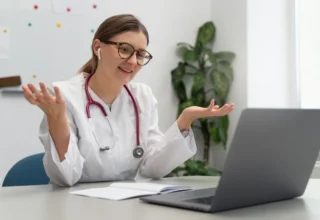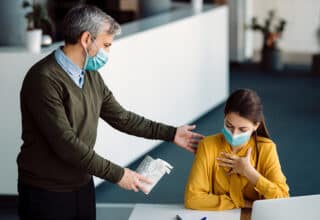Almost all of us have had stomach discomfort at some point— that burning sensation after skipping a meal, a bloated belly after eating, or just a vague feeling that something is off. Most of the time it passes. But when it becomes regular and persistent, it may be something more than just indigestion.
The two of the most common culprits behind stomach issues are gastritis and peptic ulcer disease (PUD). They can often feel the same, come from similar causes, and can even overlap. Even though they seem similar, they’re actually two different conditions. Knowing what sets them apart can help you get the right treatment and feel better, sooner.
So what exactly are they? Let’s break it down.
What is Gastritis?
Gastritis happens when the lining of your stomach gets inflamed. This inflammation can either be acute (come on suddenly and short-term) or chronic (develop slowly over time). Either way it causes symptoms like stomach ache, nausea, vomiting, and loss of appetite.
If left untreated, gastritis can sometimes progress and lead to ulcers, which are deeper sores in the stomach lining.
What is Peptic Ulcer Disease (PUD)?
Peptic ulcer disease refers to open sores or ulcers — that form in the lining of the stomach (gastric ulcers) or the first part of the small intestine called duodenum (duodenal ulcers). Unlike gastritis which is inflammation, ulcers are actual breaks or wounds in the stomach tissue and tend to cause more severe and focused pain.
Gastritis vs Peptic Ulcer Disease : Key Differences
Here’s a quick look on how gastritis and peptic ulcers compare:
|
Feature |
Gastritis |
Peptic Ulcer Disease |
|
Definition |
Inflammation of the stomach lining |
Open sores in lining of stomach or duodenum |
|
Location |
Primarily in stomach |
Stomach (gastric ulcers) or small intestine (duodenal ulcers) |
|
Causes |
Often H. pylori, NSAIDs, alcohol, stress |
Mostly H. pylori and NSAIDs |
|
Pain Pattern |
Burning or gnawing pain or generalised abdominal discomfort; often gets worse on empty stomach |
Sharp localised pain; may feel worse or better after eating depending on ulcer location |
|
Bleeding risk |
Less common, but possible |
More likely , especially with larger or deep ulcers |
|
Complications |
May lead to ulcers if left untreated |
Can lead to bleeding, perforation, or obstruction |
Similar Symptoms of Gastritis and Peptic Ulcer Disease (PUD):
Gastritis and peptic ulcer disease often present with similar symptoms, which often makes it tricky to distinguish between the two without proper medical evaluation.
Common symptoms that may occur in both condition include:
- Upper abdominal pain
- Nausea with or without vomiting
- Feeling of fullness or bloating
- Feeling full quickly after eating a small amount of food
- Loss of appetite
- Frequent burping
Some people with gastritis might not feel any symptoms, especially in mild or early stages
Distinctive Symptoms:
While gastritis and peptic ulcer disease share many common symptoms, there are some distinctive features that may help tell them apart:
Gastritis:
- Gastritis is more likely to cause generalised discomfort or burning sensation, rather than sharp or localised pain.
- It’s often triggered by things like alcohol, NSAIDs use, or infection.
Peptic Ulcer Disease:
- Ulcers tend to cause a more sharp, localised abdominal pain that sticks around.
- Pain is often associated with food intake. Duodenal ulcers usually cause pain a few hours after meals or at night, which may improve after eating. However, pain due to gastric ulcers may get worse with food.
- Ulcers can cause complications like bleeding leading to dark tarry stools or blood in vomit.
Shared Causes:
Gastritis and peptic ulcers often have the same root causes. The two main causes are H. pylori infection and frequent use of NSAIDs like aspirin and ibuprofen.
- NSAIDs reduce the protective stomach lining, making it more prone to irritation and inflammation.
- H. pylori weakens the stomach’s mucus barrier, allowing acid to damage the lining and potentially cause ulcers.
- Genetics may also play a role, as people with a family history of ulcers are more likely to develop them.
Diagnosis:
To diagnose either condition, your healthcare provider may recommend:
- Medical history and physical exam
- Blood , stool, or breath test to check for H. pylori
- Endoscopy– a small camera is used to look at your stomach lining and check for inflammation or ulcers
- Biopsy– a small tissue sample may be taken during endoscopy
Treatment:
The treatment of both gastritis and peptic ulcer disease focuses on relieving symptoms, healing the stomach lining, and addressing the root cause.
- If H. pylori is present, doctors usually prescribe a combination of antibiotics and acid reducing medicines like proton pump inhibitors (PPIs)
- If NSAIDs (like aspirin or ibuprofen) are the cause, your doctor would advise you to stop or reduce NSAIDs use and recommend medications that protect stomach lining.
- Other common medications include:
- Antacids– for quick relief
- H2 blockers– to reduce stomach acid
- PPIs – to help stomach lining heal
- Lifestyle changes can help too. These include avoiding spicy foods, alcohol, and smoking, eating smaller and more frequent meals, and managing stress with relaxation techniques.
- Follow up care is important to prevent symptoms from coming back and make sure stomach lining is healed
Alarming symptoms:
While most of the symptoms of gastritis and peptic ulcer disease may get better with over-the-counter pain relievers, you should seek urgent medical care if you’re having symptoms like:
- Sudden severe abdominal pain
- Anemia (may occur due to blood loss)
- Blood in vomiting (it may look bright red or brown like coffee ground)
- Black tarry stools
- Unexplained weight loss
- Persistent or worsening symptoms
- Difficulty swallowing or breathing
Final Thoughts:
Gastritis and peptic ulcer disease may seem similar on the surface, but they’re two different conditions. Understanding the difference between them is the first step towards proper treatment. If you have been dealing with frequent stomach discomfort, don’t just brush it off. Early diagnosis and right care can make all the difference in how to feel.
Your digestive system works hard for you, so take measures to support your digestive health.








